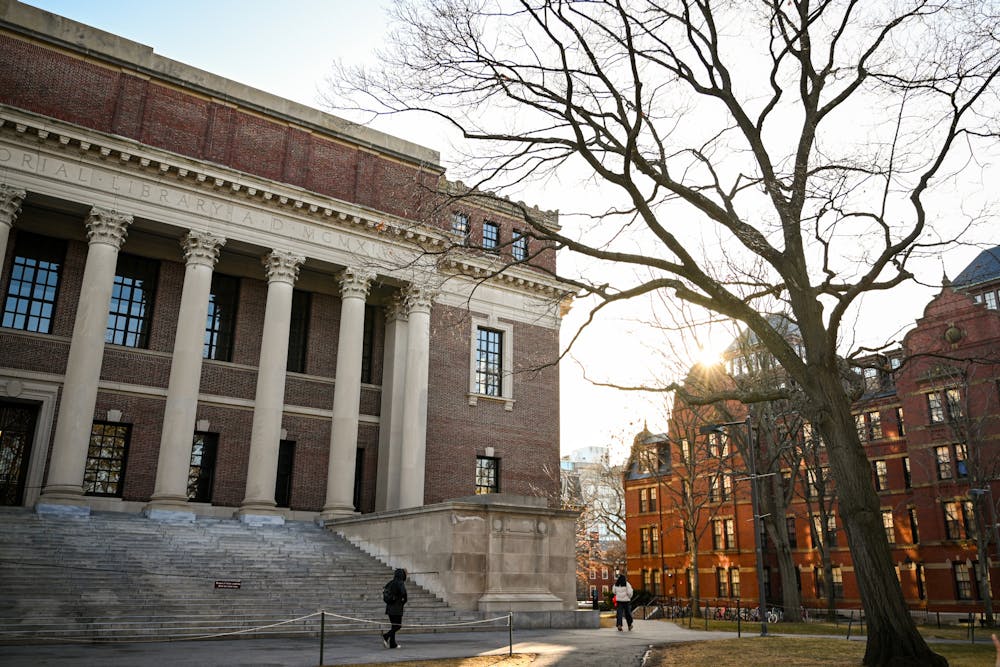Last Thursday, the Department of Homeland Security revoked Harvard’s Student and Exchange Visitor Program certification, halting the university’s ability to enroll international students. Homeland Security Secretary Kristi Noem went on Fox News later that day, warning that what happened at Harvard “should be a warning to every other university.”
A month ago, the DHS temporarily stripped the visas or immigration statuses of eight Penn affiliates, part of a wider trend that resulted in over 1,800 student visas nationwide being revoked. And in the past few months alone, the federal government has detained and threatened the deportation of international students for speaking in opposition to the Israel-Hamas war. This comes as the Trump administration has increasingly accused universities, including Penn, of fostering rigged diversity, equity, and inclusion programs, harboring antisemitism, or violating Title IX, and punishing those who don’t comply with their demands.
Despite the unprecedented federal actions targeting international students and scholars, Penn’s support for its own international community has largely felt like an afterthought. In light of the recent brazen actions against universities, Penn must urgently stand with and support its international students. If the University truly supports its international students and scholars, it must acknowledge that what happened at Harvard was not an isolated incident but part of a broader pattern of unjust federal overreach — one that demands concrete action to ensure international students are not left vulnerable.
Penn boasts an international student and scholar population of 9,143 as of Fall 2024. These students do more than just bring “DEI” into our classrooms. They are the ones advancing knowledge through groundbreaking research, supporting instruction as teaching assistants, and contributing to Penn’s core academic mission by leading labs, guiding students, and assisting faculty. Their presence is not supplementary to Penn’s mission — it is essential to it, in principle and practice.
Yet their legal status in this country remains precariously vulnerable to political whims. The Trump administration’s use of immigration enforcement and DHS as a cudgel against universities reflects the dangerous politicization of higher education, with rippling effects. Penn’s leadership must be vocal about these implications. While the University has already signaled this by signing a letter alongside 150 other university presidents and higher education leaders denouncing the “unprecedented government overreach” in higher education, simply signing a letter is not leadership. It’s time for Penn to speak, and act, for itself, lest the University find itself caught off guard by the federal government’s antics.
The University must fully affirm and be transparent in its support for international students and scholars. A statement from the ISSS staff declaring Penn’s “deep commitment to [its] international community” isn’t enough. A clear statement from Penn President Larry Jameson and the Office of the Provost — explicitly rejecting recent federal actions against international students and outlining next steps the University is willing to take in the event of Penn’s own international student ban — would prove the University is proactive in protecting its students.
More importantly, Penn must quickly establish a focused emergency legal fund and task force to support students whose visa statuses are threatened or revoked. Legal assistance is expensive and often inaccessible, and no student should have to face deportation proceedings or navigate DHS appeals alone.
While current international students should take advantage of the Student Intervention Services’ Emergency and Opportunity Funding grant and the Undergraduate Assembly’s Legal Services, a focused emergency legal fund and task force would better hedge them against the escalating legal and political threats they face today.
Harvard already has an existing legal, pro bono task force for students “from countries to which they are afraid to return” through the Harvard Representation Initiative. It also has an annual emergency legal fund of $100,000 for international workers as part of its collective bargaining agreement with the Harvard Graduate Students Union. By following Harvard’s lead and further investing in proactive legal and procedural infrastructure, Penn can ensure its international community feels and is protected.
To do any less would betray the very values Penn claims to uphold: the opportunity toward a better future for all. International students chose Penn in pursuit of opportunity. The University simply owes them the same commitment in return.
DAVID TRAN is a rising College sophomore studying urban studies from Fort Worth, Texas. His email is ddtran@sas.upenn.edu.









